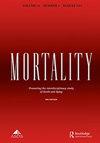古罗马的爱、死和葬礼——论利比提娜女神
IF 1
0 HUMANITIES, MULTIDISCIPLINARY
引用次数: 1
摘要
摘要罗马葬礼最显著的特点之一是,他们和相关人员都与利比提纳的郊区小树林有关,利比提娜的名字在转喻上也有“死亡”的意思。一些古代作家谈到这位女神,偶尔会把她和金星联系在一起。在本文中,我将使用转喻来探索神的语义,我将认为利比提娜是一位边缘神,她在城市边缘的地位反映了她在罗马多神教边缘的地位。这显示了语言、都市和宗教之间的紧密联系。本文章由计算机程序翻译,如有差异,请以英文原文为准。
Love, death, and funerals in ancient Rome: on the goddess Libitina
ABSTRACT One of the most striking characteristics of Roman funerals, is that they and the related personnel were associated with a suburban grove consecrated to Libitina, whose name can also metonymically mean ‘death’. Several ancient writers talk about this goddess, and occasionally associate her with Venus. In this paper, I shall use metonymy to explore the semantics of the deity, and I shall argue that Libitina was a liminal deity, whose position at the margins of the city was mirrored by her position at the margins of Roman polytheism. This shows the strong interconnection between language, urbanity and religion.
求助全文
通过发布文献求助,成功后即可免费获取论文全文。
去求助
来源期刊

Mortality
Arts and Humanities-Religious Studies
CiteScore
1.80
自引率
12.50%
发文量
42
期刊介绍:
A foremost international, interdisciplinary journal that has relevance both for academics and professionals concerned with human mortality. Mortality is essential reading for those in the field of death studies and in a range of disciplines, including anthropology, art, classics, history, literature, medicine, music, socio-legal studies, social policy, sociology, philosophy, psychology and religious studies. The journal is also of special interest and relevance for those professionally or voluntarily engaged in the health and caring professions, in bereavement counselling, the funeral industries, and in central and local government.
 求助内容:
求助内容: 应助结果提醒方式:
应助结果提醒方式:


